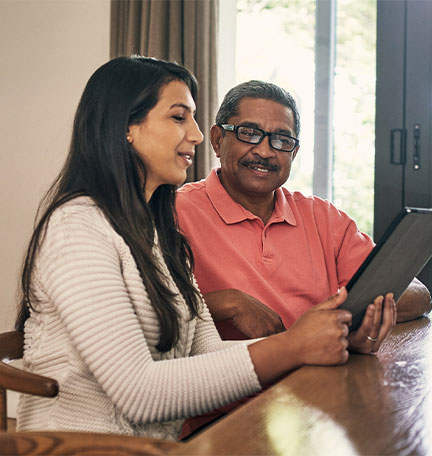Sharing too much personal information can compromise your security on social media.
Social media platforms have become a main channel for keeping in touch with loved ones, friends, acquaintances and colleagues — but there are others watching as well. Most of the strangers who see our social media pages are harmless merchants and marketers eager to learn about us and everyone we know. But there are also identity thieves, hackers, and other bad actors at work, says Regions Social Media Strategist Melissa Stewart. She offers the following best practices for keeping safe while staying connected.
Change Your Passwords Often
“Usernames and security questions are important puzzle pieces,” Stewart says. She recommends reviewing and updating all of them on a regular basis. Further, be sure to use a unique password for every login you create, and enable two-factor authentication whenever possible. Finally, if a data breach occurs on a platform, be sure to change your passwords immediately if the platform experiences a data breach.
Review Your Privacy Settings Regularly
Most social media platforms are updating their privacy settings in response to public concerns. Stewart advises reviewing the settings on your own profiles and adjusting them to your preferences. “I start with the most closed-off setting, and then select people who I want to connect with,” Stewart says.
Think Before You Post
Before you post something, Stewart advises individuals to keep in mind that potential employers, advertisers, cybercriminals, and strangers can see that information as well.
Before sharing anything on a social media platform, consider the following:
- Does it contain sensitive, personal information?
- If you’re traveling, is it necessary to share that you’re not at home, or can it wait until you get back?
- Are you comfortable sharing that comment with the whole world?
- Will it make anyone tagged feel uncomfortable?
- Can any information in it be used to answer one of your security questions?
- Do I need to make this public, or can I share it privately with a smaller group?
Log Out After Each Session
Increasingly, popular social media platforms can cache your online credentials and use them to quickly log you into other websites and apps across the web. While this is convenient, every login is a channel to your personal data and could pose security risks. Stewart advises logging out of every account, every time, to reduce the risk of identity theft.
Ultimately, it’s important to remember that everything you do on a social media platform is trackable, and that your actions are valuable data points. “Advertisers have the ability to purchase ads based on a variety of attributes, including the actions users took on Facebook such as viewing a video, liking or commenting on a page. This information is useful to advertisers who want to put their ads in front of the most relevant potential customers,” Stewart says.
For more fraud prevention tips and insights, visit regions.com/fraudprevention.











